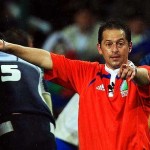 With the Six Nations looming large it might be time to have a look at what we can expect from the tournament the players, coaches and of course the referees.
With the Six Nations looming large it might be time to have a look at what we can expect from the tournament the players, coaches and of course the referees.
Firstly it might be worth mentioning that at the pre-Six Nations get together with coaches, Union officials and elite referee manager Paddy O’Brien – there was a re-emphasis of the five key points that were flagged up during the 2011 World Cup. That is the scrum, maul, offside (at the breakdown), the tackle and foul play. The other matter to note was that all the coaches bought into and supported a strict policing of these areas. Which is just as well, because illegal scrum binding will also be a focus for the referees, along with offside – where even a few inches ahead of the offside line will be jumped on.
Now remember that as you watch the tournament unfold and the pressures on players and coaches alike intensify. Will everyone remain as supportive then as now? Let’s wait and see.
The referees selected for the Six Nations this year is another opportunity for the bulk of those selected for World Cup to again do their stuff, with a couple of new additions. Jerome Garces (Fra) and Chris Pollock (NZ), make their debuts at the tournament having operated at the Junior World Championships and both been reserve referees for the main event in New Zealand last year. They continue the line of progression from the junior gig and follow such luminaries as Nigel Owens, Wayne Barnes and Craig Joubert to name but three.
As O’Brien has remarked: “We find out a lot about referees at these junior tournaments and it’s the stepping stone to full Test level. By 2015 probably all the officials will have come through the Junior World Championship system.”
There will of course be the usual moments of Six Nations high drama and I do not doubt for a minute that something will be done (or not done) by a referee, or possibly an assistant referee from the flanks, which will cause debate. We remember of course last year’s infamous ‘wrong ball’ incident involving referee Jonathan Kaplan in Wales’ match with Ireland, which Warren Gatland’s side went on to win.
There was much call at the time for the extension of the Television Match Official’s (TMO) role to prevent such an anomaly happening again. So will that be the case a year on?
Well no is the short answer, and while Super Rugby in the Southern Hemisphere trials the rugby league system of placing players ‘On Report’, there is no such movement for the Six Nations. There was a comment made by O’Brien at a business lunch in Queenstown (NZ) last November that a tournament in each Hemisphere would be using a TMO trial protocol, but as things stand it won’t be in the Six Nations this year.
As regards the ‘On Report’ trial (a system whereby the referee suspects a player or players of committing an offence (usually foul play), but can’t be sure so leaves the player on the field, but places him ‘On Report’ for a citing officer to review post match, who will then give a judicial decision either for or against the player), the camp is split.
One of the comments coming into TheRefZone was, ‘How is a review of a decision based on uncertainty, steeped in suspicion and led by doubt, a better system’? There were opposing views, some of which felt it took some of the pressures off the referees to feel he has to ‘always have eyes in the back of his head’ and concentrate on the big decisions.
But rewind there Tonto, foul play is one of the five key areas to be policed and managed strictly and therefore it is a big decision. So let’s see how Super Rugby manage things. The whole thing about experiments is that those that work can be developed and those that don’t are banished to the rugby physics lab in the sky.
For now, it’s onto the oldest tournament in world rugby (at least in its original guise), and all that goes with it. Enjoy.